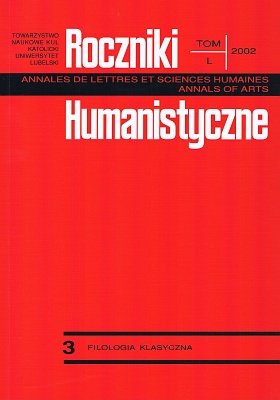The Relations between the Cult of Dionysus and the Greek Theatre in the Light of the most Recent Learned Literature. A Review of the most Important Positions
Abstract
The paper depicts the most recent literature as regards the relations between the cult to Dionysus and the Greek theatre. We find here the views of, among others, S. Goldhill, who showed the social and political aspect of the festival in honour of Dionysus, and thereby he pointed to Dionysus as the protective deity of the polis. R. Friedrich criticized this point of view. He discusses the transitory stage between the rite and the fully developed tragedy. He stated that at the source of the drama one finds ἱερὸς λόγος, dealing with Dionysus' special passion (his suffering, death and resurrection). Another scholar who touched upon this problem is R. Seaford. He directed our attention to the Dionysian myth. The scholar treats that myth and cult as elements of the social process forming the polis rather than as a source of tragedy. The theme which is of interest for us here is dealt with by P.E. Easterling. She pointed to a strong link between the Dionysian festival and dithyramb. She laid a great stress on the significance of the satyr drama which – according to her – was supposed to demonstrate the „animal” spirit of the audience. Undoubtedly, this wildness has something to do with Dionysus – the god of dance, singing, wine, and joy. This is on what the scholar bases her theory as regards the relationship between the cult of Dionysus and the theatre. Now D. Paleothodoros, while discussing this relationship, grounds his theory on the archeological research of the Athenian agora. His research indicates that the cult of Dionysus and dramatic festival were introduced to Athens at the time of the reign of the sons of Pisistratus.
References
Easterling P. E.: A show for Dionysus. W: The Cambridge Companion to Greek Tragedy. Ed. by P. E. Easterling. Cambridge 1997 s. 36-53.
Friedrich R.: Everything to Do with Dionysos? Ritualism, the Dionisiac, and the Tragic. W: Tragedy and the Tragic. Greek Theatre and Beyond. Ed. by M. S. Silk. Oxford 1998 s. 257-289.
Goldhill S.: The Great Dionysia and Civic Ideology. W: Nothing to Do with Dionysos? Athenian Drama in Its Social Context. Ed. by J. J. Winkler and F. I. Zeitlin. Princeton 1990 s. 97-129.
Kocur M.: Teatr antycznej Grecji. Wrocław 2001.
Seaford R.: Something to Do with Dionysos – Tragedy and the Dionysiac: Response to Friedrich. W: Tragedy and the Tragic s. 284-294.
Copyright (c) 2002 Roczniki Humanistyczne

This work is licensed under a Creative Commons Attribution-NonCommercial-NoDerivatives 4.0 International License.





